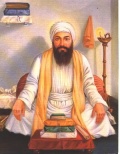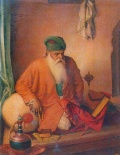Template:Did you know: Difference between revisions
From SikhiWiki
Jump to navigationJump to search
Hari singh (talk | contribs) No edit summary |
Hari singh (talk | contribs) No edit summary |
||
| Line 1: | Line 1: | ||
---- | ---- | ||
{{aowhy|[[Template:Did you know|Did you know...]]}}<div style="background-color:#FFFFEC;"> | {{aowhy|[[Template:Did you know|Did you know...]]}}<div style="background-color:#FFFFEC;"> | ||
[[Image:Guru angad.jpg|thumb|left|120px|[[Guru Angad]]]] | |||
* .... that when [[Guru Amar Das]] came to meet [[Guru Angad Dev]], [[Guru Amar Das]] was 62 years old and [[Guru Angad Dev]] was 37 year of age. | |||
* ...that only one of the Guru's wife is mentioned in the [[Guru Granth Sahib]]; it is the second master, [[Guru Angad|Guru Angad Dev's]] wife [[Mata Khivi]]. | |||
* ....that in the [[Guru Granth Sahib]], [[Barahmaha]] is written twice, once by [[Guru Nanak]] in [[Raag Tukhari]] and a second time by [[Guru Arjun]] in [[Raag Majh]]. | |||
* .... that according to [[Sikh history]], [[Gurgadi]] was passed from Guru to Guru in following way: | |||
*[[Guru Nanak]] to [[Guru Angad]] ''(No Family Relation)''<br> | |||
*[[Guru Angad]] to [[Guru Amar Das]] ''(Father to Daughter's father-in-law)''<br> | |||
*[[Guru Amar Das]] to [[Guru Ram Das]] ''(Father-in-law to Son-in-law)''<br> | |||
*[[Guru Ram Das]] to [[Guru Arjun]] ''(Father to son)'' <br> | |||
*[[Guru Arjun]] to [[Guru Hargobind]] ''(Father to Son)'' <br> | |||
*[[Guru Hargobind]] to [[Guru Har Rai]] ''(Grandfather to Grandson)'' <br> | |||
*[[Guru Har Rai]] to [[Guru Harkrishan]] ''(Father to Son)'' <br> | |||
*[[Guru Harkrishan]] to [[Guru Tegh Bahadur]] ''(Great nephew to Great uncle)''<br> | |||
*[[Guru Tegh Bahadur]] to [[Guru Gobind Singh]] ''(Father to Son)''<br> | |||
*[[Guru Gobind Singh]] to [[Guru Granth Sahib]] ''(Never done before!)''<br> | |||
[[Image:GurudwaraQilaAnandgarh.jpg|thumb|right|150px|Qila Anandgarh]] | [[Image:GurudwaraQilaAnandgarh.jpg|thumb|right|150px|Qila Anandgarh]] | ||
| Line 13: | Line 31: | ||
*..... that the word [[Singh]] from [[Sanskrit]] '''sinha''' which means '''Lion''' and is an essential component of the name for a Sikh male. | *..... that the word [[Singh]] from [[Sanskrit]] '''sinha''' which means '''Lion''' and is an essential component of the name for a Sikh male. | ||
<!----------------------------------Disabled ----------------------- | |||
*..... that the [[Sikh]] concept of '''[[Sarbaht dah Phahla]]''' which means '''"Blessings for Everyone"''' or literally '''"May everyone Prosper"''' is a new concept for many people and is not common knowledge for many followers of the Sikh religion. | *..... that the [[Sikh]] concept of '''[[Sarbaht dah Phahla]]''' which means '''"Blessings for Everyone"''' or literally '''"May everyone Prosper"''' is a new concept for many people and is not common knowledge for many followers of the Sikh religion. | ||
| Line 23: | Line 41: | ||
*.....that one of the '''five forts''' in [[Anandpur Sahib]] built by [[Guru Gobind Singh]] was called '''[[Keshgarh Fort]]'''. | *.....that one of the '''five forts''' in [[Anandpur Sahib]] built by [[Guru Gobind Singh]] was called '''[[Keshgarh Fort]]'''. | ||
[[Image:Baba atal tower.jpg|thumb|left|120px|Gurdwara Baba Atal Rai Sahib]] | [[Image:Baba atal tower.jpg|thumb|left|120px|Gurdwara Baba Atal Rai Sahib]] | ||
Revision as of 16:28, 13 July 2008
Did you know...
- .... that when Guru Amar Das came to meet Guru Angad Dev, Guru Amar Das was 62 years old and Guru Angad Dev was 37 year of age.
- ...that only one of the Guru's wife is mentioned in the Guru Granth Sahib; it is the second master, Guru Angad Dev's wife Mata Khivi.
- ....that in the Guru Granth Sahib, Barahmaha is written twice, once by Guru Nanak in Raag Tukhari and a second time by Guru Arjun in Raag Majh.
- .... that according to Sikh history, Gurgadi was passed from Guru to Guru in following way:
- Guru Nanak to Guru Angad (No Family Relation)
- Guru Angad to Guru Amar Das (Father to Daughter's father-in-law)
- Guru Amar Das to Guru Ram Das (Father-in-law to Son-in-law)
- Guru Ram Das to Guru Arjun (Father to son)
- Guru Arjun to Guru Hargobind (Father to Son)
- Guru Hargobind to Guru Har Rai (Grandfather to Grandson)
- Guru Har Rai to Guru Harkrishan (Father to Son)
- Guru Harkrishan to Guru Tegh Bahadur (Great nephew to Great uncle)
- Guru Tegh Bahadur to Guru Gobind Singh (Father to Son)
- Guru Gobind Singh to Guru Granth Sahib (Never done before!)
- ... that the tenth Guru spent 25 years at Anandpur sahib and to protect the community from the growing animosity of the hill Rajas and their Mughal allies, the Guru began the construction of five defensive Qilas (Persian for forts). One central fort with four others encircling the town....
- ... that Sikhi and Hinduism have many parallels. Hindu belief is that "It cannot be said that Sikhism, Hinduism, Buddhism and Jainism are separate religions. All these four faiths and their offshoots are one". Sikhi belief is in pluralism....
- ....the Significance of Vaisakhi - For many 1000's of years, April has been the time when farmers have put their sickles to harvest and collected the precious life saving crops...
- ..... that Hazrat Mian Mir was a famous Muslim Sufi saint who is highly respected by the Sikhs. He was a close friend of the Sikh leader Guru Arjan Dev, upon whose invitation he laid the foundation stone of the famous Sikh Golden Temple in Amritsar on 3 January 1588.



